Supreme Court Permits Live Streaming in Reserved Seats Case
The Constitutional Bench of the Supreme Court has sanctioned the live broadcast of proceedings concerning reserved seats. On Thursday, the court instructed its IT department to implement the necessary technical arrangements for the broadcast.
The decision was delivered in a concise order pertaining to multiple petitions submitted by the Sunni Ittehad Council (SIC). The court dismissed several associated requests, including objections to the bench’s composition and a demand to prioritize the 26th Constitutional Amendment case over the reserved seats matter.
The Supreme Court further rejected the appeal to postpone the reserved seats hearing until a determination on the 26th Amendment petitions was reached.
The court affirmed that the hearing would proceed as initially planned and adjourned the session until Monday.
While a comprehensive judgment will be issued subsequently, the short order has already been announced in open court.
Hearing Details and Legal Arguments
During the session addressing review petitions related to the reserved seats case, a larger bench, presided over by Justice Aminuddin Khan, recommenced the proceedings.
Senior counsel Makhdoom Ali Khan, representing women impacted by the Supreme Court’s verdict on July 12, concluded his arguments regarding the objections presented by the SIC.
Makhdoom asserted that Article 191-A and the Supreme Court (Practice and Procedure) Act supersede the application of the 1980 Rules concerning the formation of benches.
Justice Jamal Khan Mandokhail requested that the counsel specify which aspects of the 1980 Rules conflict with the recent constitutional amendment.
In response, Makhdoom insisted that the 1980 Rules are inconsistent with the updated constitutional framework, particularly in relation to the extent of review hearings.
He pointed out that the new constitutional amendment delineates the jurisdiction of the constitutional bench, while, according to the 1980 Rules, review petitions were adjudicated by the original bench.
He contended that following the 26th Amendment, cases involving constitutional interpretation must undergo review by the Constitutional Bench.
Makhdoom also questioned the number of judges on the existing bench, arguing that it should be regarded as a 13-member bench rather than 11. He stated that in such a scenario, a majority decision would necessitate the support of at least seven judges.
He also noted that a petition had been presented seeking live coverage of the case and that the SIC did not oppose the court’s decision to permit live streaming.
Another request was made, seeking adjournment of proceedings until a verdict on the 26th Amendment is declared. However, Makhdoom Ali Khan emphasized that the scheduling of cases is at the discretion of the court, not the petitioners.
He cautioned that granting the adjournment request would prevent the Constitutional Bench from hearing any petitions until the 26th Amendment case is resolved, setting a precedent that could encourage similar requests based on individual preferences.



Comments (0)
No comments yet. Be the first to comment!
Leave a Comment